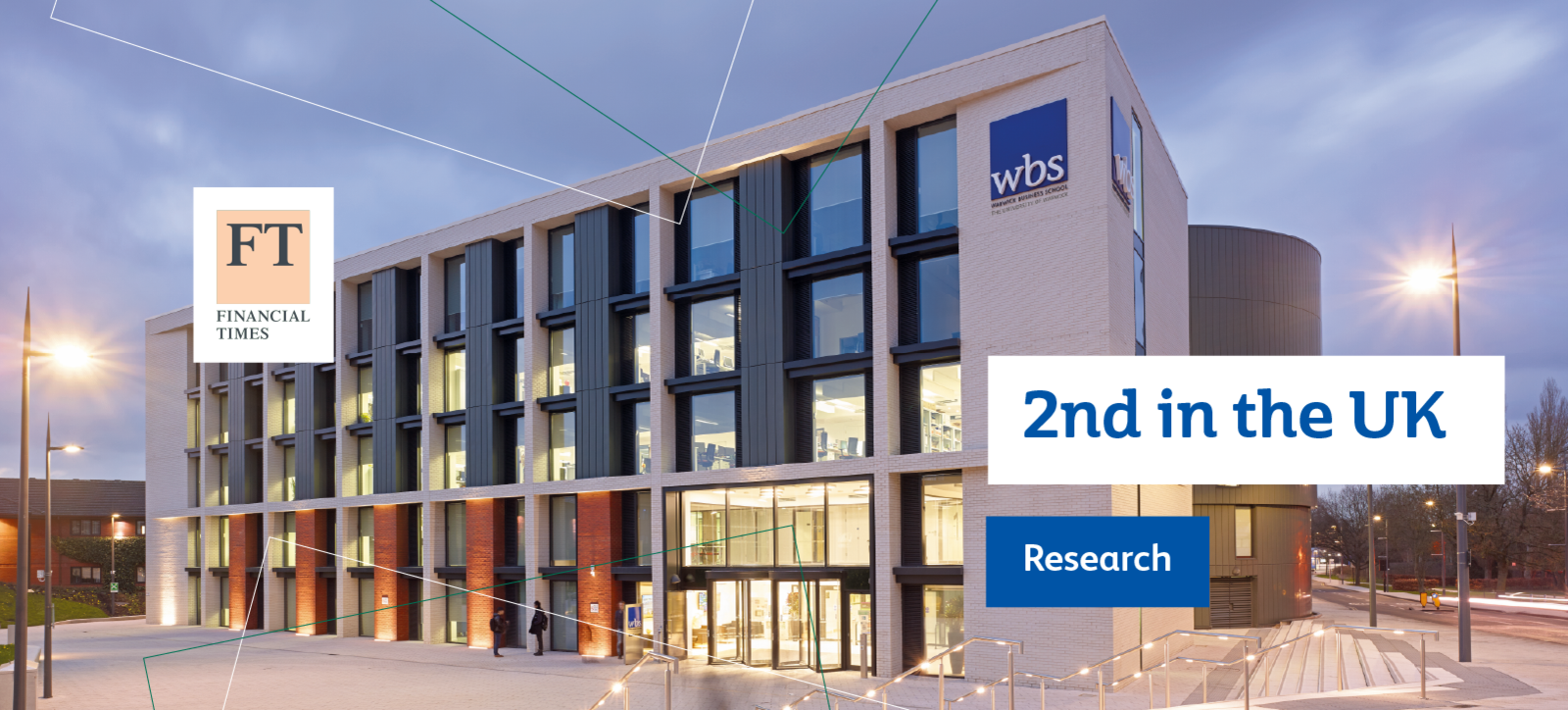
Impact: the work of academics at Warwick Business School is recognised in a new FT report
Warwick Business School is second in the UK and sixth in Europe for the quality of its research, according to a new ranking by the Financial Times.
The business publication’s new ranking, which placed WBS 23rd in the world, set out to examine the impact of individual academics’ work, and, by extension, their institutions, by measuring not only the rigour but also the relevance of their research.
While the perceived value of an academic paper usually hangs on its publication in prestigious journals and the number of citations it receives from fellow scholars, the FT ranking adds three broader measures: rigour, resonance and relevance.
WBS scores particularly highly on resonance – the measure of how much its ideas are reaching key decision-makers and policymakers outside academia. Drawing on data on practitioner downloads from the Social Science Research Network (SSRN), an open-access website for pre-prints of academic research papers, the FT ranked WBS seventh in the world.
And in a table compiled by the FT on the most downloaded recent papers by business school academics, a paper co-authored by Hila Lifshitz, Professor of Management, was ranked second. Navigating the Jagged Technological Frontier looks at how companies should be using generative AI.
The FT also examined the citation of articles in government policy documents, consultation reports, and by think-tanks.
Neil Stewart, Professor of Behavioural Science and Pro-Dean for Research, Engagement & Impact, said: “It is great to see the influence our research is having on the world beyond universities, for example in our studies on generative AI.
“As a School, we have long encouraged research that has a broader impact on society. To be judged second in the UK and sixth in Europe in a ranking that looks at the relevance of research as well as its rigour confirms to us that this focus has been worthwhile.”
How far business school authors’ textbooks and research articles were being assigned by universities in their courses and reading lists – in other words, the number of works cited in syllabi – was another measure of resonance. Here, WBS came out ninth among business schools globally.
Aligning with the UN’s Sustainable Development Goals
To track academic rigour, the Financial Times considered papers published in its FT50 list of top journals, and used an open access tool called OpenAlex to identify how far they had been cited in other academic journals over the past three years.
On relevance, it looked at how far the content of academic articles were aligned with the United Nations’ Sustainable Development Goals.
In this respect too, WBS performed well, ranking 26th in the world.
Andy Lockett, WBS Dean and Professor of Strategy and Entrepreneurship, said: “We often say that Warwick Business School is for the Change Makers – those who want to change the world for the better.
“That also applies to our academics whose dedication to addressing societal challenges has been recognised by this report.”
Just recently, business magazine Corporate Knights ranked the Full-time MBA at WBS as third in Europe for sustainability.
Meanwhile, WBS research into some of the world’s trickiest issues continues apace. A research project backed by WBS is helping Rohingya refugees in Bangladesh set up small businesses. The School’s EXIT (EXploring Innovation in Transition) study has been looking at how to improve outcomes for teenagers leaving care. At the same time, its Impact Fund has funded research into how behavioural science techniques can help Thailand’s highland communities protect the rainforest around them.
The UK Government’s Research Excellence Framework has rated 93 per cent of the School’s research ‘world-leading’ or ‘internationally excellent’.
Find out more about our Change Makers at Warwick Business School.




 X
X Facebook
Facebook LinkedIn
LinkedIn YouTube
YouTube Instagram
Instagram Tiktok
Tiktok